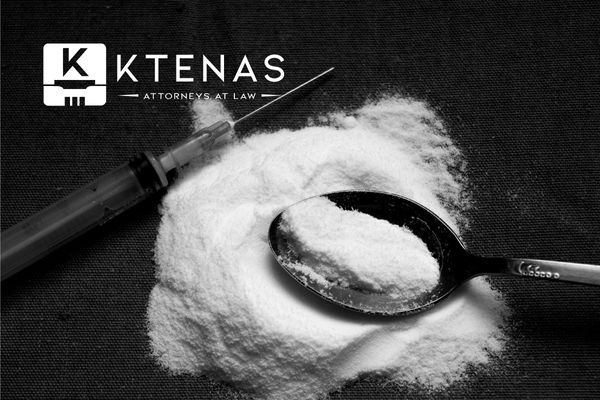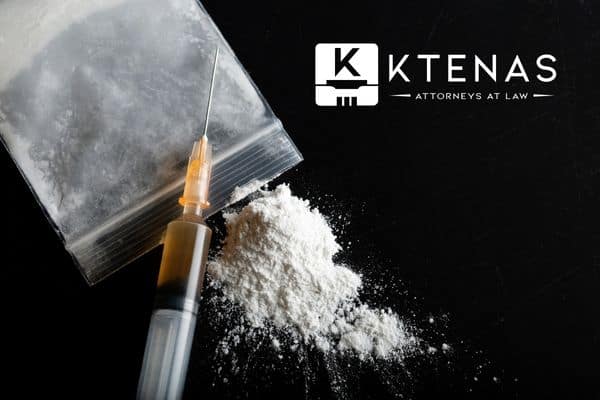Can You Legally Record Police Officers?
11/09/2025
Possession of any amount of heroin is a serious crime in Illinois, and possession of even one gram of heroin with the intent of selling it is a felony. A conviction for a felony drug charge can lead to jail time, heavy fines, loss of employment opportunities, and travel restrictions. In addition, a conviction can negatively impact your ability to obtain financial assistance, including student loans and grants. Many are stating that drug abusers are switching to heroin if they have prior drug convictions or drug crime penalties.
It’s important for you to contact an experienced drug defense lawyer in Chicago right away if you’re facing charges or time in prison related to the possession of heroin.
Heroin is a schedule one controlled drug (CDS). Possession of heroin is among the most serious crimes of drug charges. Possession of heroin comes with harsh penalties including losing your rights and liberties for years or even decades, losing your job because of a felony charge on your criminal history, and an uncertain and difficult road ahead where you struggle to find your footing in the world with a felony charge on your background. Given what is at stake, it is essential you retain the services of an experienced attorney who has handled these kinds of cases before.

Schedule 1 drugs are some of the most dangerous and usually receive the harshest penalties for possessing, manufacturing, and distributing them.
Possession of fewer than 15 grams of heroin is usually a misdemeanor drug offense, but depending on the amount of heroin or a substance that contains heroin, the possible sentences vary. A conviction for possession of between 15 grams and 30 kilograms of heroin could result in a maximum penalty of 10 years in prison. Possession of more than 30 kilograms of heroin would be punishable by 20 years in prison. You will have long-term consequences. You won’t have days in jail more than 4-15 years.
Penalties for possessing heroin will vary depending on the quantity of heroin that was seized. A full list of potential penalties is available at 720 ILCS 570/402 Here is a list showing the number of penalty points for each type of offense:
FAQ: Do I need to get a lawyer for my drug charges in Chicago?
If an individual has possession of large quantities of drugs, they may also be charged with drug trafficking. Drug trafficking is covered by 720 ILCS 571/402. A person who has committed a crime involving even half an oz of heroin could face up to a 5-year prison sentence. A conviction for distributing just sixteen ounces is a class X felony, which is the most severe crime in Illinois’ criminal code and could lead to six to thirty years imprisonment. Those found guilty of a class X offense cannot plead their case down to probation.

If an individual is caught possessing or distributing heroin within 1,500 feet of a school, church, park, or movie theatre, they could face harsh penalties. Also, if a gun was used during the commission of the crime, even harsher penalties would be imposed.
Possession of heroin is a crime that carries serious consequences. If you are found guilty of possessing heroin, you may face prison time and heavy penalties. Your criminal history will remain on your record forever. You will also lose access to federal financial assistance such as Pell Grants, student loan forgiveness, and job training benefits. Students who are caught with drugs during school hours will likely be expelled from school.
Class X can lead to between 6-30 years of jail time.
In many criminal cases, those who are found guilty of possessing large quantities of drugs may also be charged with drug trafficking. Delivery of even 0.5 grams of heroin has the potential to result not only in 3-years imprisonment but also in a fine of $100,000. Possession of just 16 grams is considered a Class X Felony, the most serious charge under Illinois Criminal Law. Conviction of a Class X felony carries a penalty of between six and thirty years in jail. If you are convicted, there is no possibility of plea bargaining; you must face the full consequences of your actions.

Illinois’ laws impose particularly harsh penalties on those convicted of crimes involving drugs. Possession of any amount of heroin is considered a serious offense under Illinois’ criminal code. In addition, an individual who possesses 15 grams of heroin or more faces a mandatory minimum sentence of four (4) year imprisonment and a possible penalty of fifteen (15) year imprisonment. Furthermore, a conviction for this quantity of heroin can lead to fines of up to two hundred thousand dollars ($200,000).
Informal penalties for not complying with the law include some or all of these things:
The criminal offenses of possession of heroin and cocaine are set forth in the Illinois Criminal Code of 1961 (720 ILCS 5/401 et seq.). Possession of any quantity of a controlled substance is unlawful. Heroin is classified as a schedule 1 narcotic, and cocaine is classified as a schedule 2 narcotic. These substances pose the highest risks for physical harm and provide no legitimate medical use or safe therapeutic applications. See 720 ILCS 5/102.1(b)(2) & 102.3(c).
If you want more information about heroin drug laws, contact a criminal defense lawyer today at Ktenas Law firm. A criminal defense attorney will give you a free consultation today. This drug defense law firm will go over your drug distribution charges, your imprisonment for drug possession, your informal consequences, and your time in prison.

